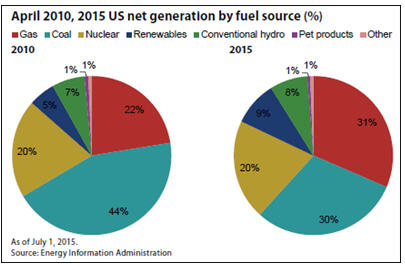We saw a resurgence in the late 20th century, with some commercial success. The Toyota Prius comes immediately to mind, a hybrid vehicle that uses a small engine to charge batteries on the fly. One example that I point to as a stark evolution point is the dominance of the diesel-electric locomotive. Huge, hulking machines that use diesel engines to charge batteries that run electric motors that pull our trains all over the US.
I tell you all this to provide a background. It seems that Elon Musk has come out with what he thinks is the third generation of his electric car. The Tesla Model 3.
Standing before a collection of new Model 3s, Musk reminded the audience that the car represented the culmination of a long-held dream to bring affordable, zero-pollution vehicles to the world's highways.Zero pollution? What charges the batteries? How is the electricity produced?
It seem sthat if we combine coal and gas, those two fuel sources still account for over 60% of US electric production. In the past, I called those cars "coal-powered" because that's where the energy comes from. Now, I'll have to come up with another name to reflect the base energy source.
There is no free ride, not even electric vehicles. We've made huge strides but we're not there yet. I'm just sayin'.

7 comments:
If we want to minimize pollution by switching to electic cars, we'd be best served by streamlining the approval process for standardized modern nuclear plants.
Currently, it's not that electric cars are particularly low-pollution. It's that they produce their pollution where their power is generated, rather than where the cars are used.
Never mind that pure electic models (rather than hybrids) don't really work for anyone who needs a single affordable car capable of both long trips and short commutes. And no, despite their range, Teslas don't count - they're high-end luxury cars, and they *still* aren't as range-flexible as a gasoline-powered econobox.
The last few times we've bought cars (one car wore out, two kids headed off to college) we looked at the cost trade off between a hybrid and an economical conventional car. And every time, the economical conventional car won. Our younger daughter is currently driving the 10-year-old model I bought the first time I ran the numbers. And after 10 years, the total cost of ownership of that car, including gasoline, is *still* a bit lower than the cost of the comparably equipped Toyota Prius I'd considered at the same time.
I like the *idea* of better gas mileage, and will happily buy a hybrid at the point that cost of ownership is equivalent to that of a conventional design. But not before. And I'll only consider a pure electric when, again, it makes economic sense.
Electric cars are nothing new, there was the Baker Electric, at least one version of which used a solar collector of some sort to help charge the battery. Of course, they were awfully expensive for the time, but hey, innovation costs, right?
The last Bakers rolled off the line in about 1916.
Diesel-electric locomotives do not have batteries in the primary power loop. I've worked on 'em.
They do have batteries for powering control auxiliaries and for starting, but basically the diesel engine spins a generator which powers electric traction motors.
MC
This is either perpetual motion or a wind generator that Crosley used to sell: http://truebluesam.blogspot.com/2008/09/answer-to-your-energy-needs.html
As other have pointed out, locomotives, ships, and some heavy equipment use diesel electric drive. This is for efficiency and size; for many ships, it is cheaper to have an engine drive a generator and the electricity from that drive an electric motor than it is to machine, build, and maintain a drive train, and crucially, large and high tolerance reduction gears (both factors that lead to high cost and long manufacturing times). WWII Liberty ships all used electric drive like this so that reduction gears could be reserved for warships that really needed them.
A few pieces of heavy equipment such as front end loaders now use batteries when they are idle for AC, lights, etc, but batteries are insufficient for operating large equipment like them.
Some studies say that the cost and pollution from making large battery packs outweighs the reduced pollution from not burning gasoline - even if you don't take into account the fact that the batteries only last for about 3 years.
Electric vehicles have promise, but like wind power and solar, they are NOT ready for prime time despite what their proponents say.
You are absolutely right that Electric cars are a great idea for many people but the truth is that electric vehicles are there for many decades. I think they are quite good that’s the reason I am also going to buy one soon and have been recently reading Electric car buyers guide.
very nice publish, i certainly love this website, carry on it. PLease visit webstagram to know top idol on instagram.
Post a Comment